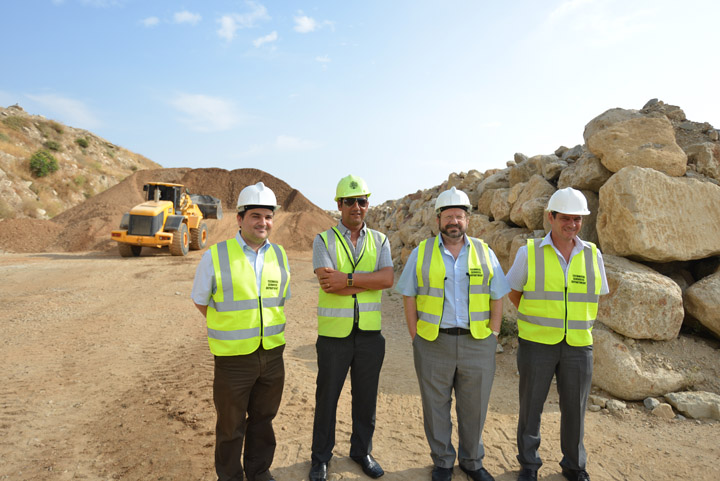Jul 12 - Commonwealth Park Soil Manufactured Locally
 Commonwealth Park needs about 3000m3 of soil for planting of trees and shrubs.
Commonwealth Park needs about 3000m3 of soil for planting of trees and shrubs.
Under normal circumstances this would have been imported from Spain. Some issues arise with that on a scheme of this size, namely: the quantities, quality and consistency of the material cannot be guaranteed; there are doubts as to the environmental impact of the extraction process in Spain, especially given the current lull in construction activity; the possibility of delays and issues at the border, as with any other material and the transport operation equates to 150 journeys by heavy lorry from potentially far afield, with their consequent carbon impact.
As a consequence the Gibraltar Botanic Gardens, the Government’s Landscaping consultants, recommended engaging a specialist soil consultant. Tim O’Hare Associates, who specialise in Soil Science and Landscape Engineering, have been involved in numerous prominent schemes including soil manufacturing for the landscaping of the Olympic Park in London and have been engaged for the project. They advised that it would be advantageous to manufacture our own soil using resources available in Gibraltar.
Since then, Technical Services Department has stockpiled suitable material on the east side reclamation. This has come from various building sites in Gibraltar and would otherwise have been consumed in the general fill. Instead, the material has been tested chemically in order to manufacture soil. The testing ensures that a precise recipe can be followed in order to provide a match for the subsoils already present at the Commonwealth Park and ensure that plant and tree species imported are suited to specific soil profiles.
The manufacturing process began on 19th June. Material is being loaded into a crusher/screener that sieves it and separates stones and other elements larger than 50mm from the finer soil. The fine material is discharged in a neat pile, collected and taken to a soil compound where it awaits the next stage of the process. Larger stones pass through the crusher and are broken down to a maximum of 50 mm in size. This is discharged as crushed stone, which is then collected for use as fill and drainage layers on the site. This first stage is expected to be complete by the end of the month. The proportion of stone and soil produced is on average it is about half and half and as much as possible will be used at Commonwealth Park.
Two types of soil are required for use on the site: topsoil and subsoil. The topsoil layer has organic material incorporated by mixing the soil with manure in proportions specified by the soil-manufacturing recipe. The combined materials are then mixed by machine to ensure consistency. The final stage of the process involves passing the material through the screening machine again to remove all stones greater than 35mm. That material is then stockpiled and subjected to final testing to ensure the soil matches the specifications stipulated in the manufacturing report. It is then ready for use at the site.
Manure will be imported from nearby Spain and deliveries are programmed for September when the bathing season is over, for completion of the manufacturing process. The manure is well rotted and odourless and this too has been subjected to rigorous chemical testing, with the most suitable source selected out of several available.
The benefits of soil manufacturing are:
• The quality of the soils is controlled and consistent throughout the entire manufacturing process.
• We are sure of the precise origin of the material.
• We are increasing self-sufficiency in the supply of this essential material.
• We are adding value to material that would otherwise have been used as general fill, i.e., we are recycling soil and stone from Gibraltar.
• The resulting environmental benefits are also significant in terms of a reduced carbon footprint.

Latest News
- Chamber Responds to the 2025 Budget
- TG Welcomes Budget Surplus But Criticises “Underinvestment” And “Lack of Affordability Measures”
- The Budget 2025 – Minister Joe Bossano's Address
- 2025 Walks Through History Summer Programme
- Minister Cortes Meets Minister Morgan
- Gibraltar NASUWT Welcomes Creation Of 49 New Permanent Teaching Posts
- Charity Cardboard Boat Race To Take Place This August
- The Budget 2025 – Minister John Cortes' Statement
- Commencement of Part 2 of the Register of Property Occupation Act
- Autumn Poetry Competition 2025



